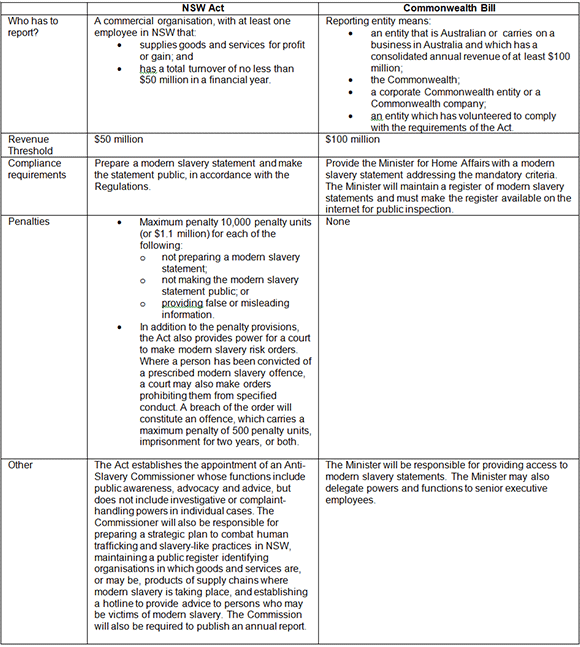Australia's regulatory approach to the issue of modern slavery
Current statistics suggest there are more than 40 million victims of modern slavery worldwide1, with over half of the victims being exploited in the Asia-Pacific region in industries including agriculture, construction, electronics, extractives, fashion and hospitality2.
Last week, the New South Wales State government and the Australian Federal government each took important steps towards addressing the issue of modern slavery.
The New South Wales government leads the way in Australia, as the first State to pass legislation with the key objective of combatting modern slavery. The Modern Slavery Act 2018 (NSW) (NSW Act) seeks to achieve this through mandatory reporting in the supply chains of commercial organisations. The rationale behind mandatory reporting is that it will require reporting entities to conduct due diligence on their supply chains and not contract with suppliers that may place them in breach of the legislation.
At almost the same time the Federal Government introduced the Modern Slavery Bill 2018 (Federal Bill), which has the same broad objectives as the NSW Act.
What is modern slavery?
The NSW Act defines modern slavery as conduct involving the use of any form of slavery, servitude or forced labour to exploit children or other persons taking place in the supply chains of commercial organisations.
Importantly, the definition of a modern slavery offence includes offences committed outside of New South Wales.
Differences between the State and Federal legislation
While the objectives of the NSW Act and the Federal Bill each have human rights concerns at their core, there are some material differences in application and enforcement.
These differences are summarised in the below table.

Important takeaways
- Clearly this legislation creates a significant administrative burden on organisations based in New South Wales and consideration has been given to how the dual reporting requirements will operate alongside one another. We understand that once the Federal legislation is developed, the NSW reporting requirement will not apply to commercial organisations who report under a prescribed equivalent federal or state law; however it is not clear how the NSW Act will operate alongside any overseas reporting requirements.
- For any organisations who supply goods and services to NSW government agencies, the NSW Act provides powers for the State Procurement Board to direct agencies to carry out steps that ensure goods and services procured by, and for, government agencies are not the product of modern slavery.
- At the time of writing this article, the NSW government had not yet drafted the Regulations to accompany the NSW Act, which Regulations will contain the requirements of modern slavery statements. However, at present, the Federal Bill contains an onerous list of mandatory criteria which are to be included and so it is possible the State Regulations will be equally burdensome.
1 Global Estimates of modern slavery: Forced labour and forced marriage, International Labour Office, Walk Free Foundation and International Organization for Migration, Geneva, 2017
2 Explanatory Memorandum, Modern Slavery Bill 2018 (Cth) [4] 2



